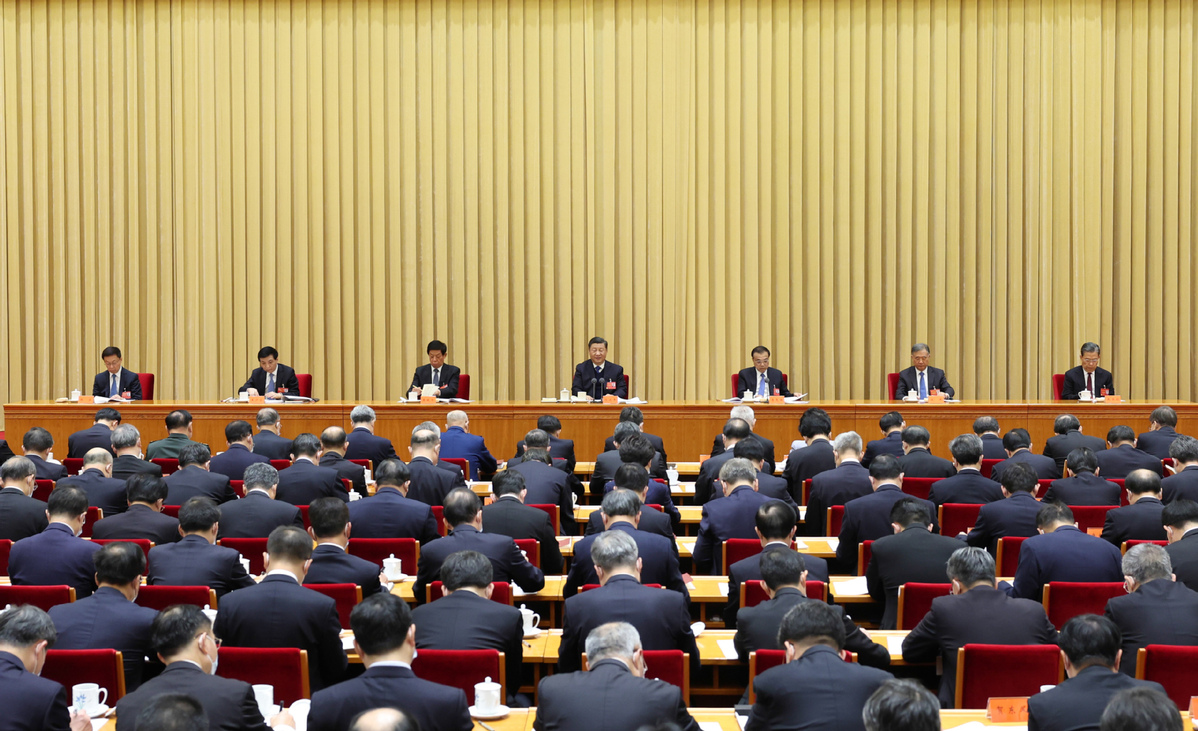
China has mapped out the priorities for its economic policies in 2022, highlighting stability as a major target and the necessity to maintain the intensity of fiscal expenditure and roll out new tax cuts and fee reductions in shoring up economic growth.
The three-day annual Central Economic Work Conference, which concluded on Friday in Beijing, outlined key tasks in seven aspects, including steps to make macro policies prudent and effective, energize the vitality of market players and ensure the healthy growth of the real estate sector.
Xi Jinping, general secretary of the Communist Party of China Central Committee, Chinese president and chairman of the Central Military Commission, reviewed the country's economic work in 2021 and mapped out plans for next year at the conference.

With the CPC set to convene its 20th National Congress next year, policymakers underlined the importance of enabling sustained improvements in people's well-being, stabilizing the fundamentals of the macro economy and keeping major economic indicators within a proper range.
They also pointed out that China's economy now faces pressures related to demand, supply and expectations.
However, the long-term positive fundamentals of the nation's highly resilient economy will remain unchanged, they said.
The meeting called for setting up a mechanism of "green and red lights" to strengthen effective oversight over capital while supporting its healthy development.
It is important to amplify the positive role of capital as a factor of production and effectively curb its negative effects, the policymakers said.
China has scaled up support for economic growth recently, with the central bank announcing earlier this week that it will cut the amount of money financial institutions must set aside in reserve by 0.5 basis points from Wednesday, which released 1.2 trillion yuan ($188 billion) worth of long-term liquidity into financial markets. China's economy grew by 4.9 percent in the third quarter compared with a year earlier, down from the 7.9 percent growth seen in the second quarter.
The meeting reiterated the policy stance of carrying out a proactive fiscal policy and a prudent monetary policy, saying that the proactive fiscal policy must be more efficient, tailored and sustainable.
The progress of fiscal expenditure next year must be expedited, and investment in infrastructure should be conducted ahead of the normal schedule, they said.
The prudent monetary policy must be accommodating and appropriate to maintain liquidity at a reasonable and adequate level, and financial institutions will be guided to bolster support for the real economy, especially in relation to smaller firms, innovation in science and technology and green development, they said.
The meeting stressed the need to lift the competitiveness of the manufacturing sector and to ensure that housing is for living, not for speculation.
The nation will accelerate the development of the long-term rental housing market, push forward the construction of affordable housing projects and support the real estate market to better meet the reasonable demand of homebuyers.
In implementing policies supporting science and technology, the policymakers decided to carry out a three-year action plan to reform the scientific and technological system, strengthen the national strategic force in the sector and restructure key national laboratories.
The nation will steadily move forward with the reform of sectors that are monopolistic in nature, such as power grids and railways, and promote opening-up at the institutional level, with measures to fully ensure that foreign businesses are offered equal treatment with their domestic counterparts and to attract more multinationals to invest in China, they said.
To ensure that social policies can meet the people's basic living needs, the meeting called for improvements to the mechanism under which residents obtain public services based on where they actually live. It is important to give priority to youth employment and refine the labor and social security policies for workers employed on flexible payrolls, the policymakers said.
The meeting also clarified key theoretical and practical issues facing the nation as it enters a new phase of development.
In attaining common prosperity, the policymakers underscored that the nation must make the "cake" bigger and better through the joint efforts of all people before establishing a mechanism to ensure its proper distribution.
It is imperative that the employment-first policy is further reinforced, the role of distribution is amplified and public service policies and mechanisms are improved during the process, they added.
It highlighted the need to give priority to the conservation of primary products, including energy and minerals, and to enhance the domestic capacity for the production of resources.
In preventing and diffusing major risks, the policymakers stressed the need for adequate resources in this regard, saying that policies for the diffusing of risks should be in the pipeline and the financial risk settlement mechanism should be refined.
They underscored the need for unwavering efforts to move forward with work in peaking carbon emissions before 2030 and attaining carbon neutrality before 2060, while recognizing that it would be impossible for the nation to accomplish everything at one stroke.
Given the fact that China predominantly relies on coal for its energy supply, the policymakers decided that the country will not include newly added renewable energy resources and their raw materials in the curbs in total energy consumption.
The meeting also stressed the importance of stepping up adjustments in the transportation of coal, electricity, oil and gas to ensure adequate power supplies.